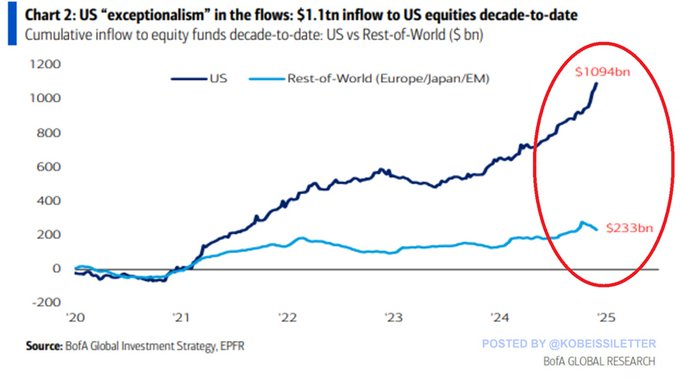EDI commitment. Credit: Twitter handle of The Kobeissi Letter
Over the past year, several major corporations have scaled back their equity, diversity and inclusion (EDI) initiatives amid shifting political pressures. Walmart is one of the latest major corporations to reduce its EDI programs following conservative backlash and U.S. President-elect Donald Trump’s re-election.
Ford Motor Company, Lowe’s and Nissan have all announced plans to change their diversity, equity and inclusion (DEI) policies. In the entertainment sector, Hollywood’s commitment to EDI has waned, with several studios and networks reducing or eliminating diversity programs.
This growing trend reflects a broader corporate retreat from EDI commitments, as businesses navigate the complexities of the current political landscape. So far, many have chosen to respond by negating their commitment to inclusion and diversity.
Given the close economic and cultural ties between the United States and Canada, this troubling shift could spill over into Canada. It would undermine years of progress towards achieving genuine workplace equity. Ultimately, no one will benefit in the long run—not even the people opposed to it—as they will miss out on the benefits of a more inclusive and diverse workforce.
Walmart: From EDI commitment to rollback
As the largest private employer in the world with over two million employees, Walmart has long been at the center of debates about labor practices, workplace diversity and corporate responsibility.
For years, the company championed EDI principles. In 2019, Walmart made a public commitment to boost diversity, pledging to increase the percentage of women and racialized people in managerial roles.
Walmart also introduced initiatives to support underrepresented groups in the workforce, including diversity and inclusion training, the Women’s Resource Community, the OneTen Coalition program and partnerships to recruit people with disabilities. It
also tracked workforce representation by gender and ethnicity. Its 2023 report revealed that 20 percent of promotions from hourly to management position were Black and racialized women. Over 86,000 employees completed race and inclusion training, and nearly 800 participated in Walmart’s Culture, Diversity, Equity and Inclusion Institute.
However, amid a political climate marked by renewed attacks on corporate diversity initiatives and so-called “wokeness,” Walmart started rolling back its EDI policies and diversity training programs.
For instance, the company has decided not to extend its racial equity center, a five-year initiative that was launched in 2020. Additionally, it will discontinue the use of terms such as “LatinX” and “DEI” in official communications, opting instead to use the word “belonging.” But who truly belongs if, at the same time, they are cancelling EDI initiatives?
Understand what EDI means
This rollback of EDI initiatives reflects a growing trend within big business to selectively adopt social justice agendas when they are advantageous, then scale them back when the political climate changes. This “diversitywashing” mirrors greenwashing where companies claim to support social or environmental causes but retreat when faced with political or public pressure.
At its core, EDI is about ensuring that all employees, customers and stakeholders have equitable access to work opportunities, regardless of race, gender, sexual orientation, disability or socio-economic background.
EDI policies and practices are essential for supporting equity-deserving groups—such as women, Black and racialized people, Indigenous Peoples, people with disabilities and 2SLGBTQ+ communities—who have historically faced systemic barriers to opportunity.
Arguing for a meritocracy without first establishing equity is like trying to lift a sloped playing field instead of leveling it, while ignoring that one side is a mountain and the other is a canyon. It leaves existing barriers and inequities intact on the road to merit, telling people that hard work alone will lead to rewards, while ignoring that they need to work that much harder to achieve the same.
The idea that we must create an even playing field first should not be controversial, and yet it is.
The fear that EDI programs compromise competency is both common and unfounded; embracing diversity is about dismantling barriers that have unfairly limited opportunities for talented individuals, not lowering standards.
Why corporations must commit to EDI
EDI initiatives should never be reduced to political tools or marketing gimmicks. The true purpose of these policies is to foster an environment where people of all backgrounds can thrive.
When corporations roll back these initiatives in response to political pressures, it signals to the world their commitment to EDI was merely a strategic move to improve their brand image during a period when social justice was a trending topic.
This can damage a corporation’s reputation in the eyes of both employees and consumers, particularly those from equity-deserving groups who expect representation, as well as those who value diversity and inclusivity.
It is essential for large corporations to recognize that adopting EDI policies is not just a moral imperative, but also a sound business strategy. The data is clear: diverse companies perform better, including from a profitability standpoint.
Diversity-related advantages create a competitive edge that drives growth. A McKinsey report revealed that companies with more diverse executive teams were 36 percent more likely to have above-average profitability. Giving that up is simply bad business.
As both a scholar and a practicing strategy and organizational change consultant, I have never encountered a well-designed and effectively implemented EDI program that did not yield positive results for the organization.
EDI is good for business and good business: it is both the ethical choice and the smart business decision.
Walking the talk
The way forward is clear: corporations, especially large ones, must make a genuine commitment to EDI—not just because it is the morally right thing to do, but because it is the key to long-term business success. Diversity fosters innovation, and innovation drives profitability.
However, for employees of diverse backgrounds to truly thrive in their workplaces, organizations must go beyond surface-level representation and tokenism. They must build inclusive workplaces where diversity is genuinely respected, supported and embraced unconditionally and independent of political trends.
By doing so, companies will not only contribute to a more equitable society, but also position themselves for success in an increasingly diverse global marketplace. Achieving this requires leaders who are courageous and prioritize long-term strategic goals over short-term political gains.
Leading through fear is not leadership; it reflects a failure in strategic foresight. Talent is the defining competitive advantage of this century, and business leaders cannot afford to waste it.
Provided by The Conversation





